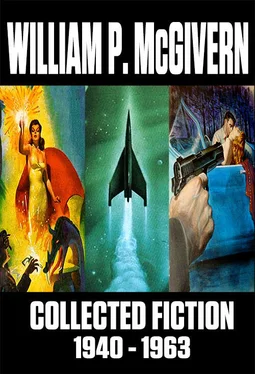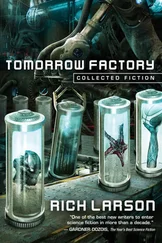Уильям Макгиверн - Collected Fiction - 1940-1963
Здесь есть возможность читать онлайн «Уильям Макгиверн - Collected Fiction - 1940-1963» весь текст электронной книги совершенно бесплатно (целиком полную версию без сокращений). В некоторых случаях можно слушать аудио, скачать через торрент в формате fb2 и присутствует краткое содержание. Год выпуска: 2014, Издательство: Jerry eBooks, Жанр: Ужасы и Мистика, Фантастика и фэнтези, Детектив, Прочие приключения, на английском языке. Описание произведения, (предисловие) а так же отзывы посетителей доступны на портале библиотеки ЛибКат.
- Название:Collected Fiction: 1940-1963
- Автор:
- Издательство:Jerry eBooks
- Жанр:
- Год:2014
- ISBN:нет данных
- Рейтинг книги:3 / 5. Голосов: 1
-
Избранное:Добавить в избранное
- Отзывы:
-
Ваша оценка:
- 60
- 1
- 2
- 3
- 4
- 5
Collected Fiction: 1940-1963: краткое содержание, описание и аннотация
Предлагаем к чтению аннотацию, описание, краткое содержание или предисловие (зависит от того, что написал сам автор книги «Collected Fiction: 1940-1963»). Если вы не нашли необходимую информацию о книге — напишите в комментариях, мы постараемся отыскать её.
Collected Fiction: 1940-1963 — читать онлайн бесплатно полную книгу (весь текст) целиком
Ниже представлен текст книги, разбитый по страницам. Система сохранения места последней прочитанной страницы, позволяет с удобством читать онлайн бесплатно книгу «Collected Fiction: 1940-1963», без необходимости каждый раз заново искать на чём Вы остановились. Поставьте закладку, и сможете в любой момент перейти на страницу, на которой закончили чтение.
Интервал:
Закладка:
“Not so fast now. We haven’t given Doolittle a chance to answer these charges. Come now, Oscar.” Botts’ voice had a kindly, mellow ring to it. “If you have anything to say in your defense, I, for one, will be happy to listen.”
Under the effects of these encouraging words Oscar opened his eyes and cleared his throat. He realized that he was facing the supreme test of his life. Now, if never again, he must prove himself a man of character and dependability. If he could impress Botts with his honesty and integrity, he knew that Botts would stick by him. It was now or never.
His spirit rose to the challenge. He squared his shoulders, grimly determined to force Botts to recognize his sterling qualities. He glared around the circle of eyes. Oscar Doolittle, mouse turned lion!
He opened his mouth — but the words that he had chosen were never uttered.
For the strange buzzing noise was booming in his ears again, and with horrible clairvoyance he realized what was going to happen.
“I’m going!” Oscar cried. “I can’t help it. I’ve got to go — but I’m not guilty!”
One of the policemen tugged at his gun.
“You’re not going anywhere, buddy,” he said grimly. “Grab him, Charlie.”
But he was too late. For before his astounded eyes the humble person of Oscar Doolittle melted into thin air for the second time that day.
He stood before them invisible, unseen to their eyes. A fine way to convince a man of your dependability, Oscar thought bitterly.
“Cripes,” ejaculated the officer called Charlie, “did you see that? He disappeared right in front of our eyes!”
“Nonsense!” bellowed Phineas Q. Botts. “Drooling, driveling nonsense. Expect me to believe a man vanished like a wisp of smoke? He slipped out of the room, right past you so-called policemen, that’s what he did. I saw him myself!” shouted Botts, who had seen nothing of the kind.
“Well, what are you standing there for?” Botts demanded. “He’s probably walking out of the building this minute.” The banker banged a meaty fist on the top of the desk. “Get busy, do you hear? I want action, not talk about disappearing men! Now by thunder, clear out of here and find Oscar Doolittle!”
Oscar Doolittle at the time was standing not six feet from the wrathful Mr. Botts. The two policemen, looking rather dazed, backed out of the room and pounded off down the corridor. In a minute or so the alarm was sounding throughout the building.
“That’ll fix him,” declared Botts. “Can’t say as I’m not a little disappointed, though. Didn’t think Doolittle was that type. But his attempt to escape leaves no doubt of his guilt.”
Oscar stifled a groan. He could never clear himself now.
Mercer looked uneasy. “Are you sure you saw him leave, Phineas? I can’t say that I did.”
“Certainly I did,” blustered Botts, who by now was certain that he had seen Oscar leave. “He ducked under the desk and slipped through the officers’ legs.” He chuckled heartily. “The old fox is getting along but he’s still pretty sharp, eh, Mercer? Still sees a lot of things you youngbloods overlook.”
“Maybe you’re right,” Mercer said dubiously. “I hope so, anyway,” he added under his breath.
Botts turned and waddled importantly from Oscar’s office, Mercer bringing up the rear.
Oscar Doolittle was left alone in his invisibility.
He sighed and slumped into his chair, buried his head in his hands. This was the last straw. Branded forever as a common thief! And no way to prove his innocence. It would have been difficult under normal circumstances, but now that he was invisible it was utterly hopeless, impossible.
But was it?
The thought bounced into Oscar’s brain quite of its own accord. He was invisible; he could escape; or he could search for evidence to prove himself not guilty. The mere thought was enough to fan the fires of hope that blazed in his heart.
Excited, he scrambled to his feet. He was convinced that Mercer was connected in some way with the disappearance of the bond.
If he shadowed Mercer— Any chance, no matter how slim, was worth taking.
His heart fluttering with hope, Oscar hurried from his office, ducked through the stream of people and headed for the lobby.
Seconds later, entering the lobby, he saw clusters of uniformed policemen guarding every exit. Phineas Q. Botts stood in the center of the floor, his feet planted wide like an angry bull, his rumbling voice shouting orders to policemen, messengers and vice-presidents — anyone, in fact, that came within radius of the bellows.
Oscar spied Mercer talking earnestly to Ann Meade in front of the tellers’ cages. Dodging the traffic, he scurried across the floor until he stood directly behind Mercer’s broad back.
“I’m doing all I can for Oscar,” Mercer was saying smoothly. “But it looks like an open and shut case against him.”
Oscar felt a swift, hot surge of anger. Mercer, the lying hypocrite, was attempting to get in solid with Ann, by pretending to be helping him.
“I don’t believe he did it,” Ann returned stoutly. “He may be a timid, helpless creature, but he’s not a thief.”
“Certainly not,” Mercer said heartily. “I like Oscar and I’m proud to call him my friend.”
“He was a nice little fellow,” Ann said wistfully. “Even if he was so futile.”
Mercer cleared his throat loudly. He could carry this thing too far.
“Ann, there’s something I want to ask you,” he said quickly. “The employees of the bank are holding their annual dance tonight and I want you to go with me.” He added hastily as Ann looked indecisive. “We could probably get some more information about Oscar there.”
“That will be wonderful,” Ann said, smiling. “It was lovely of you to ask me, Lester.” She glanced at her watch and gave a little cry of dismay. “Heavens, I’m late! I’ll have to fly. ’Bye-’bye until tonight.”
Mercer watched her out of sight, his face beaming smugly with the assurance of a man who has made a good impression and knows it.
Oscar walked around in front of Mercer, scratching his head. He was puzzled about what to do next. Suddenly he noticed Mercer start violently and turn pallid. He followed the direction of Mercer’s eyes and saw a slim, stylishly furred brunette approaching. She smiled brightly, displaying dazzlingly white teeth, as she stopped in front of Mercer with a swish of her short pleated skirt.
“Hello, ducky,” she said. “Didn’t forget me, did you?”
“Celeste, I told you not to come here!” Mercer hissed. “This might spoil everything, you little fool.”
He glanced over his shoulder, his eyes roving the interior of the bank fearfully. Finally he turned back to the girl.
“Luckily we haven’t been seen. Follow me to my office. You can talk to me there.”
He turned on his heel and strode off. Celeste shrugged her slim shoulders and strolled after him at a more languid pace.
Oscar dogged her steps. Some instinct warned him that she was connected in some way with the disappearance of the twenty-five thousand dollar bond. In spite of her glamorous appearance, she looked as cold and business-like as a pearl-handled revolver.
With pulses hammering excitedly, Oscar followed her eagerly. It was his first experience at amateur sleuthing, and to his surprise he found himself enjoying it.
Chapter IV
In Durance Vile
Lester Mercer was pacing the floor of his sumptuously appointed office when they entered. Celeste opened the door, but before she closed it Oscar had slipped in as unheralded as a well-behaved ghost.
“What is it you want?” Mercer burst out. “You took a chance on spoiling the whole game by coming here.”
Читать дальшеИнтервал:
Закладка:
Похожие книги на «Collected Fiction: 1940-1963»
Представляем Вашему вниманию похожие книги на «Collected Fiction: 1940-1963» списком для выбора. Мы отобрали схожую по названию и смыслу литературу в надежде предоставить читателям больше вариантов отыскать новые, интересные, ещё непрочитанные произведения.
Обсуждение, отзывы о книге «Collected Fiction: 1940-1963» и просто собственные мнения читателей. Оставьте ваши комментарии, напишите, что Вы думаете о произведении, его смысле или главных героях. Укажите что конкретно понравилось, а что нет, и почему Вы так считаете.

![Уильям Макгиверн - Завтра опять неизвестность [английский и русский параллельные тексты]](/books/35168/uilyam-makgivern-zavtra-opyat-neizvestnost-angli-thumb.webp)









